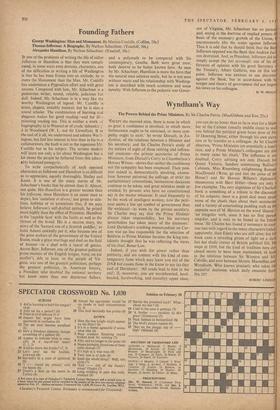Founding Fathers
IF one of the problems of writing the life of either Jefferson or Hamilton is that they were compli- cated, in some ways even devious, characters, one of the difficulties in writing a life of Washington is that he has been frozen into an attitude; he is more the Monument than the Man. Mr. Cunliffe has undertaken a Pygmalion effort and with great success. Compared with him, Mr. Schachner is a pedestrian writer, sound, reliable, judicious but dull. Indeed, Mr. Schachner is in a way like the worthy Washington of legend. Mr. Cunliffe is acute, elegant, amiably ironical, but he is also a sound scholar. The combination of learning and elegance makes for good reading—and for illu- minating reading too. This is neither a work of hagiography (a la Weems) or of crude `debunkit a la Woodward (W. L. not Sir Llewellyn). If at the end of it all, we understand and admire Wash- ington, but feel less interest in him than in his two collaborators, the fault is not in the ingenious Mr. Cunliffe but in his subject. The serious student will learn not only a lot about Washington but a lot about the people he fathered from this admir- ably balanced panegyric.
To write sympathetically of such opposed characters as Jefferson and Hamilton is as difficult as to appreciate, equally thoroughly, Shelley and Keats. It is one of the many merits of Mr. Schachner's books that he almost does it. Almost, not quite. His Hamilton is a greater success than his Jefferson, since Hamilton is an easier man to depict, less `ondulant et divers,' less given to side- lines, hobbies or to avocations that, if we may believe Jefferson's self-drafted epitaph, he prized more highly than the office of President. Hamilton is the 'capable Scot' with the faults as well as the virtues of the breed. His is a success story, the story of the 'bastard son of a Scottish peddler,' as John Adams unkindly put it, who became one of the great makers of the government of the United States, made a great marriage and died on the field of honour—in a duel with a rascal of genius, Aaron Burr. Jefferson, one of the greatest political prose masters of the English tongue, born, on his mother's side at least, to the purple of Vir- ginia,-was one of the greatest politicians, perhaps the greatest politician, in American history, a President who doubled the national territory but knew more than one disastrous failure, and a polymath to be compared with his contemporary, Goethe. Both were great men; both deserve to be better known here. As seen by Mr. Schachner, Hamilton is more the hero that the natural man admires easily, but he is not seen without warts and his relationship with Washing- ton is described with much acuteness and some novelty. With Jefferson as the pedantic war Gover- nor of Virginia, Mr. Schachner has no patien and, seeing in the doctrine of implied powers t basis of the necessary growth of the Union, unconsciously tilts the scales against Jefferso Thus it is odd that he should think that the Ba Jefferson opposed was the Bank that Andrew Jac son destroyed. And, as President, Jefferson did n simply accept the fait accompli; one of his di ferences of opinion with his great Secretary the Treasury, Albert Gallatin, was on this ve point. Jefferson was anxious to use discreti against the Bank, but in accordance with temper and theory of government did not impo
his views on his colleague. D. W. moon






































 Previous page
Previous page